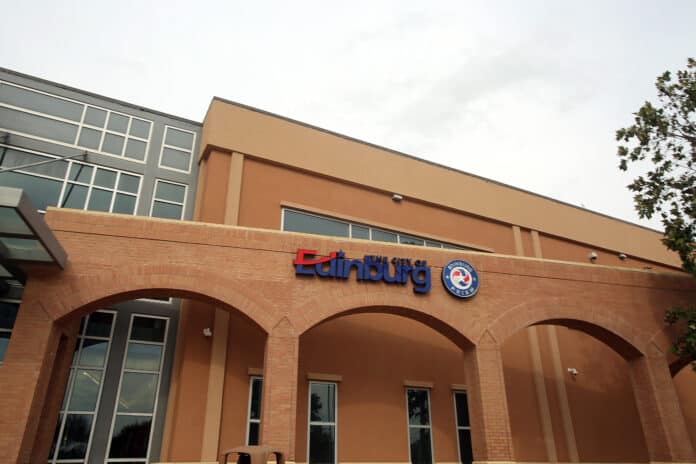
|
Only have a minute? Listen instead
Getting your Trinity Audio player ready...
|
Edinburg city officials are mulling increasing utility rates over the next five years in order to keep up with the rising cost of doing business, as well as to fund more than $260 million in water and sewer infrastructure projects.
The Edinburg City Council is considering one of two proposals that would raise water and sewer rates for the first time since 2011.
The rate hikes are necessary to keep up with inflation, but also to bankroll more than 80 different projects over the next 5-10 years, according to Dan V. Jackson, vice president of Willdan Financial Services.
Last year, the city tasked the firm with conducting a study of Edinburg’s water and wastewater rates. Officials heard the results of that study during a workshop last month.
On Tuesday, the council was slated to discuss holding a public hearing regarding the rate increases, which are slated to go into effect on March 1, according to a copy of the Jan. 16 meeting agenda.
Jackson presented two options to city leaders — one that would distribute the rate increases evenly across the next five years, and another that would “front load” them in the first year, then smaller increases in subsequent years.
An average residential consumer uses about 5,000 gallons per month and pays about $26.87 for water and sewer service in Edinburg.
That figure does not include charges for trash service, taxes or other fees typically seen on a utility bill.
Under the first option, residents would see their utility bills go up by about $3 per month, but under the second option, those bills would go up $6 per month.
No matter which option the council chooses, residents will ultimately see their average bill go up from $26.87 per month to about $45 per month by 2027, Jackson explained.
The consultant softened the blow by adding that — even with the rate hike — Edinburg residents will still be paying some of the lowest rates in the state.
Jackson explained that a rate increase is needed to keep the utility a self-sustaining operation — one that can continue to pay for the increased demand that come with Edinburg’s booming growth, and one that can pay for costly infrastructure upkeep and expansions.
“Your costs are going to go up in the future,” Jackson said, adding that inflation alone accounts for a 3-4% increase in operating costs each year.
The bulk of those higher costs, however, are going to come from the debt Edinburg will need to issue to fund some 87 projects that are part of the utility department’s capital improvement plan, or CIP.
“The city of Edinburg is projected to spend $260 million over the next five years to repair, maintain and expand the water and sewer system,” Jackson said.
The projects range in cost from a $10,000 to $60 million and include:
>> $60 million for a 10 million gallon per day water plant
>> $60 million to upgrade the existing wastewater treatment plant and build a new 5 million gallon per day wastewater treatment plant
>> $20 million for the city to purchase additional water rights
>> $10 million to reline the city reservoir
>> $6.25 million to construct a new 1 million gallon per day water tower
>> $6 million to construct a new raw water line, and more
“That’s a lot of money, but in all honesty, for a city this size, that’s not really out of proportion,” Jackson said.
The consultant said Edinburg will likely pay for the infrastructure projects through a variety of means, including tapping into the city’s general fund and federal COVID-19 relief funds; however, the bulk of the projects will have to be financed.
“We’re projecting that you’re gonna have to issue about $226 million in debt between 2024 and 2029 in order to fund this capital improvement plan,” Jackson said.
Willdan projects that Edinburg will have to issue nearly $95 million in revenue bonds — debt that will be repaid over the next 30 years using proceeds from utility revenues.
Another $132 million is expected to come via low interest loans from the Texas Water Development Board.
All told, that debt burden will double the utility fund’s operating costs — from the current $22 million to $44 million a decade from now.
And again, the bulk of that cost will go toward paying down debt.
“Of that $22 million increase, $12 million is debt, and the other $10 million is operating expenses increasing,” Jackson explained.
After the presentation, the council took a moment to ask Jackson questions.
Mayor Ramiro Garza Jr. cautioned city administrators to take into consideration the financial straits caused by previous councils.
“As you all know, there have been bonds issued in the past where we weren’t even ready to issue bonds, but yet, we’re already collecting those taxes from our residents,” Garza said.
In 2021, the council — led by then-Mayor Richard Molina — approved of $21.46 million in certificates of obligation to fund several projects, including an arts and cultural events center, and a downtown parking garage.
The Edinburg Economic Development Corporation similarly approved an additional $10 million in sales tax revenue bonds for the projects, including some $2.25 million earmarked for the parking garage.
But, last summer, city leaders learned that sufficient study of the city’s downtown parking needs had never been carried out prior to the debt issuance. To date, the parking garage project has stalled out though the city has already begun to pay interest on the debt.
“Whatever we’re looking to do, that we do it in a way that we do a proper balance. I don’t want to have the ratepayers having to pay for things that we’re not prepared to do at this time,” Garza said.




